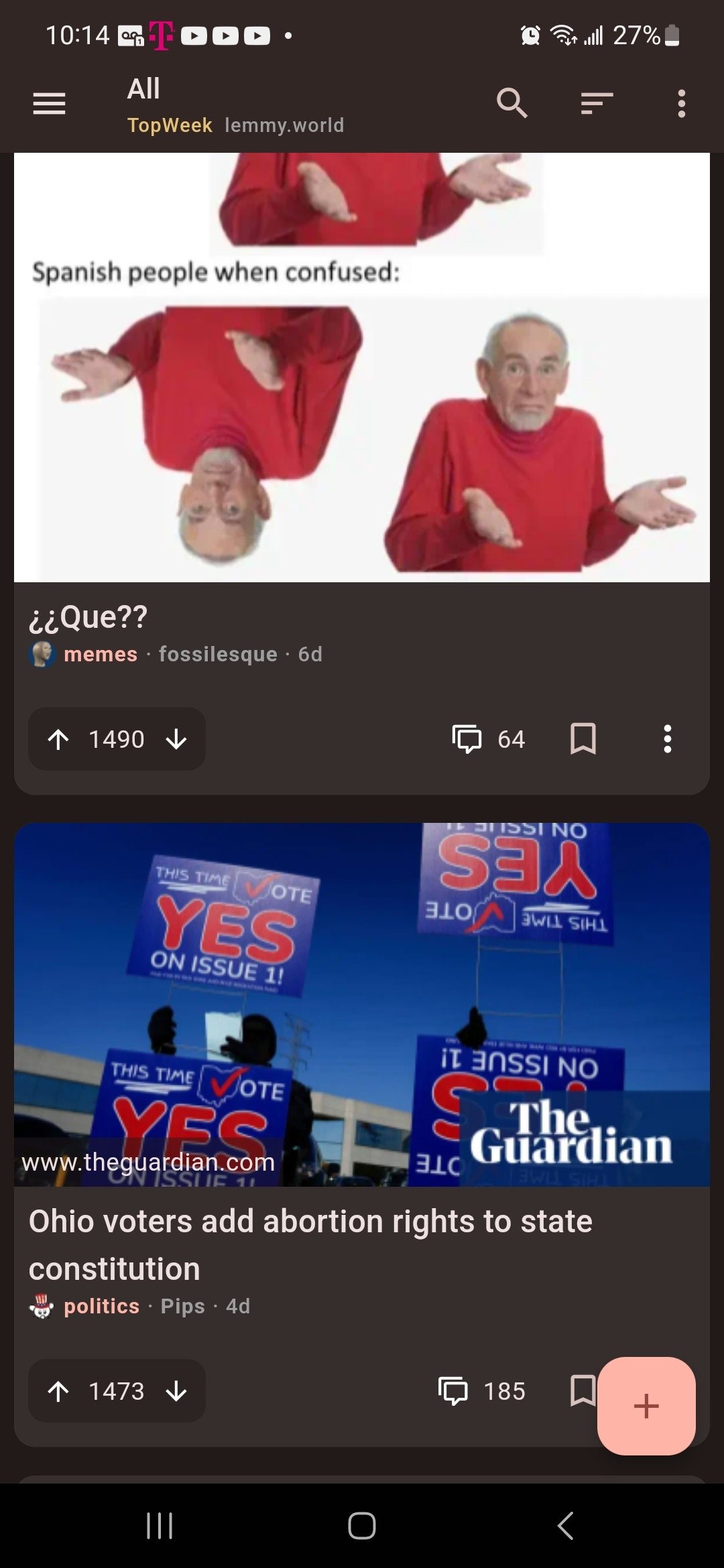I like the prefix marks. I wish we used them for all of our punctuation. They improve readability. Imagine if we removed the leading double-quote on our quoted lines.
As a latin American myself, I never considered that. As a programmer, I completely back that up.
.I feel like this analogy doesn’t entirely work because you always know where the question starts, as that’s where the sentence startS. ,And a sentence always starts where the one before ends, ¿righT? .However I still see why you say it improves readabilitY. ¡I’m sure my comment is very readable right noW!
I don’t mind the prefixed punctuation at all and don’t think it hurts readability in the slightest.
Your inexplicable decision to capitalize the final letters is awful though, and definitely makes it less readable.
lol noted, I was just goofing around
.I feel like this analogy doesn’t entirely work because you always know where the question starts, as that’s where the sentence startS.
Not always. For example (translated):
And you, ¿how are you?
You could write that as “And you? How are you?” so both parts of that sentence are still a question.
However there are other examples where you’re right: “,That’s not going to happen, ¿or is it?”
I feel like the first example in your comment implies a different intonation than it’s equivalent in PooloverNathan’s comment. Also I feel the need to admit that I first read ¿)Nathan’s(? username as “Pool-over” as in “pull over”…
lol yeah I guess it depends on the length of the sentence and the context. Context is usually pretty clear for questions, and maybe exclamations are typically short enough that the ‘!’ is already visible anyways. Definitely wasn’t considering periods and commas in that list.
Statement: Perhaps HK-47’s programmers had the right idea.
Thoughtful: The Elcor’s manner of speech from Mass Effect would be particularly useful when communicating through text as well.
Approving: Indeed
Sarcastic: Indeed.
Wow. So that’s how you can actually do sarcasm on the interwebs!
Yeah, I never got the upside-down questionmark as well 😂.
In Spanish questions are phrased the same way as affirmations, when you are speaking the only difference is the intonation. Without a mark to say you are starting to read a question it’s possible that the meaning changes in the end which would be annoying. (Source: Portuguese is the same but has no inverted question mark, and sometimes it’s mighty annoying, especially with long questions)
Portuguese is the same but has no inverted question mark, and sometimes it’s mighty annoying,
¿What if you just used them anyway?
¡Problem solved!Yeah that’s true for any language really
Not really. In my language subject and verb get switched around in a question. So you immediately know it’s a question when you start reading the sentence.
Can you give me an example?
I know you already got it but a few others came to my mind:
Finnish, which not a tonal language:
- Sinä pidät kahvista. (“You like coffee.”)
- Pidätkö kahvista? (“You like coffee?”)
Japanese:
- Anata wa kōhī ga sukidesu. (“You like coffee.”)
- Kōhī wa sukidesu ka? (“You like coffee?”)
I think you’ll find the pattern of question words/suffixes in nearly every language that is not explicitly tonal.
Yeah that’s initially why I thought there was no difference to Spanish. But the difference is Spanish actually doesn’t have an option where you switch subject and verb. Didn’t know that :)
Oh. Very good point. I did not know that either.
-
Hij schreef een bericht. (He wrote a message)
-
Schreef hij een bericht? (Did he wrote a message?)
Zeg eens, waarom wil je zo graag met een CEO slapen?
-
It’s so you can start reading a sentence in the correct intonation
This can’t be right. It’s far too simple and logical. I’m a native English speaker, and I’m used to grammar that’s nonsensical and inconsistent.
In spanish questions intonation changes occur only on the last word(s), not the whole sentence. I’m not a linguistic, but I think it’s so you can be sure a sentence is a question from the start.
When reading english sometimes I assume a sentence is an affirmation until I see the question mark, and then I have to reinterpret the sentence. I wonder how it is for native english speakers. Do they assume nothing until the sentence is finished?
In English most questions stay flat and only raises the pitch on the last syllable, if any. In Spanish we can raise the pitch on the first word and stay flat for the rest of the question. That’s what’s useful about the ¿
In spanish questions intonation changes occur only on the last word(s), not the whole sentence. I’m not a linguistic, but I think it’s so you can be sure a sentence is a question from the start.
That might be the case in the dialect you’re familiar with, but “¿Me dijiste que no te moleste?” has a different intonation to “Me dijiste que no te moleste.” in my Spanish (starting from “dijiste”).
As for English, questions normally start either with a question word or a (auxiliary) verb, while affirmations normally start with the subject. See “You told me not to bother you.” vs. “Did you tell me not to bother you?”. Using just intonation is possible (“You told me not to bother you?!??”), but when in writing, it’s usually formatted in a way that highlights it because it usually indicates outrage/disbelief.
Interesting. Afaik what determines a question is a higher pitch, so in your sentence I wouldn’t think of the sentence as a question until I hear the intonation of the last word.
Like, toda la oracion puede tener cualquier tono, pero si la última palabra tiene un tono mas agudo (molesteee en vez de moleste) recien cuenta como pregunta.
Me puse a pensar y escuchar conversaciones, fijandome si el tono cambia siempre en la ultima palabra, o en algun otro lado, y en donde vivo (casi) siempre el tono cambia en la ultima palabra, incluso solo la ultima silaba.
Me pregunto si de donde eres toda la oracion (o, desde “dijiste”) el tono es más agudo, o si usan otra forma para diferenciar?
The higher pitch for the entire sentence is another option in my Spanish, but indicates outrage.
The version where you hear it’s supposed to be a question from the word “dijiste” is more of a request for information, like if your mom yelled something and you’re not sure if she said “No me molestes” or “No te sorpreses” or something else that sounds vaguely similar or if she was actually yelling at a fly that was going on her nerves.
The sentence overall becomes more melodic, with the stressed syllables getting a higher pitch and more defined stress.
(Latin American fellow) At first I thought this was an Australia-style joke, because there are Spanish speaking countries in both hemispheres. Yep, I can overthink stuff and still be an idiot lol
🙃 me gusta ☺️

¿cómo?










